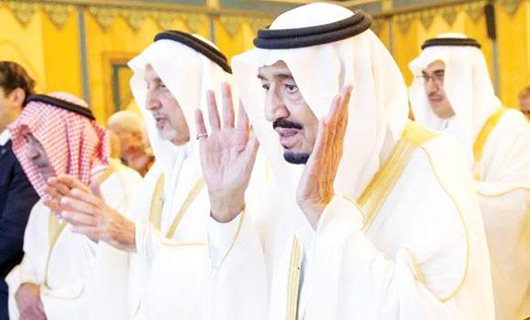
Jeddah/Riyadh, Jul 29: Crown Prince Salman, deputy premier and minister of defense, performed Eid Al-Fitr prayer at the Grand Mosque in Makkah in the presence of a massive congregation.
He was joined by Prince Bandar bin Mohammed bin Abdulrahman, Education Minister Prince Khaled Al-Faisal, Prince Ahmad bin Abdulaziz, Prince Khaled bin Fahd bin Khalid and Deputy Crown Prince Muqrin.
Custodian of the Two Holy Mosques King Abdullah was congratulated on the advent of Eid Al-Fitr by Egyptian President Abdel Fattah El-Sissi and King Abdallah of Jordan via telephone, while former Prime Minister of Lebanon Saad Hariri also attended the prayers.
In his Eid sermon, Imam Saleh Al-Humaid said the Muslim nation should be considered a single body, where if one part is in pain, the whole body becomes responsive, just like a healthy body is all-encompassing.
“Muslims in neighboring countries are facing crises, problems and catastrophes provoked by enemies,” he said.
“Muslim orphans, widowers, homeless people, refugees, the less fortunate and the sickly are in need of our support and solace,” he said. “Indeed, many of our fellow Muslims are spending this Eid in misery and humiliation.” He expressed his gratitude for divine bounties while urging Muslims to be pious and God-fearing.
Al-Humaid told listeners that humans are intrinsically social creatures. “People need one another in all aspects of life,” he said. “Everyone should have access to food, housing, clothing, education, treatment and employment, but we humans also have emotional needs that are fulfilled through friendship and networking based on need or mutual interest.”
He added: “Individual morals and ethics are manifested through their relations with others, whether relatives, friends or strangers. “Loneliness and isolation are not conducive for any human being, let alone believers.”
Al-Humaid highlighted the importance of empathizing with the plight of fellow Arabs.
Money is not the only means to help out, said the sheikh.
“Roads to charity include good deeds and sound morals,” he said. “People’s first source of happiness should first and foremost be their belief and faith in God and their desire to engage in good deeds without expecting praise in return.”
Al-Humaid also advised believers to use Eid as an opportunity for reconciliation and to drop grudges and ill-feelings.
Meanwhile, more than one million performed Eid prayers at the Prophet’s Mosque in Madinah. Sheikh Salah Al-Budair the led prayers and delivered the Eid sermon.
“We must preserve our religion and follow our Prophet’s guidance,” he said. “We also must true understand Qur’anic verses without perverting their original meanings.”
Riyadh also greeted the beginning of Eid Al-Fitr with zeal and zest.
Eid prayers were offered at around 400 mosques, while special arrangements were made for women by placing improvised partitions just after sunrise.
Riyadh Gov. Prince Turki bin Abdullah bin Abdul Aziz performed Eid Al-Fitr prayers at the Imam Turki bin Abdullah mosque and later met with princes, scholars, senior officials and a group of citizens, who came to congratulate him on the auspicious occasion.
Prince Turki also visited patients in hospital and wished them a speedy recovery, joy and tranquility.
Riyadh’s governorate and municipality collaborated with several official and unofficial bodies to come up with elaborate arrangements for recreational events and colorful activities throughout the city.
The Riyadh Police has made a comprehensive security plan for the weeklong festivities.
Seven locations, including the Prince Faisal bin Fahd Stadium in Malaz and the King Fahd International Stadium in Naseem, were the scenes of much-awaited festivals and dazzling fireworks displays, according to sources from the Riyadh Municipality.
Festive locations were distributed geographically across the city, while the firework show will commence at 11:15 p.m. over a period of three days.
“The fireworks display is fascinating to watch,” said one housewife. “The explosion of various colors against a black sky truly gripped me.”
Another major attraction during the grand celebrations is the fountain dance show at the King Abdullah Park in Malaz.





Comments
Add new comment